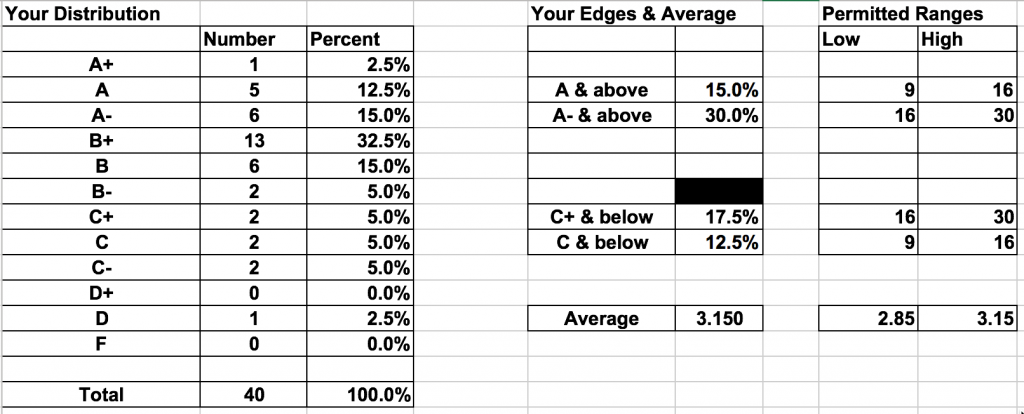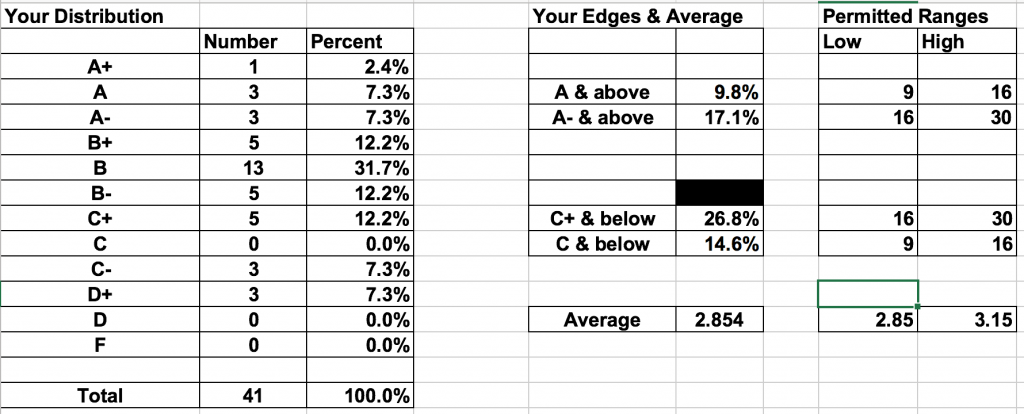Hello everyone. I apologize for interrupting your summer break with this note. I have submitted grades for Constitutional Law. You can download the exam question, and the A+ paper (If this is yours, please drop me a line!). I am very proud of this class.
Here is the distribution for the final exam. The mean was 3.150. This is more or less the highest possible distribution I could give to fit within the College’s mandatory curve.

This is a significant improvement from the midterm, where the mean was 2.854.

Here are some high-level observations about the question.
Question 1
This question was a mashup of President Roosevelt’s strategy to pack the Supreme Court in 1936, and a contemporary debate about the Consumer Fraud Protection Bureau (CFPB), which exists as an “independent” agency.
- The first question asked you to consider whether the restrictions placed on the Director’s removal runs afoul of the Appointments Clause. At this time, Morrison v. Olson had not yet been decided, but the Court had resolved Humphrey’s Executors and Myers. In addition, we have the “Decision of 1789.” You should have discussed whether restricting the President’s removal power, for only cases of “inefficiency, neglect of duty, or malfeasance in office” was unconstitutional. You should also have noted that the removal power is nowhere mentioned in the Constitution, but has been derived from the President’s duty to take care that the laws are faithfully executed.
- The second question asked you to consider whether the CPFB Director had the authority to “issue” the Seizure Rule pursuant to Section 3 of the CFPB Act. This inquiry is separate from whether he had the authority to actually “seize” the raisins pursuant to Section 4 of the CFPB Act. (This was the subject of question 3.) Many students confused the answers to questions 2 and 3. Question 2 did not ask if Congress had the authority to regulate “commerce that is intermingled between two or more states.” Rather, it asked if Congress could delegate the authority to the CPFB to “issue rules concerning commerce that is intermingled between two or more states.” The answer to that question is no, in light of Schechter Poultry, for it would amount to an unconstitutional delegation of legislative powers. Discussions of commerce clause authority were relevant, but did not directly answer the question.
- The third question asked, directly, about whether the CFPB Director could constitutionally seize the raisins. Specifically, did the taking of the raisins run afoul of the Takings Clause of the Fifth Amendment? Though you will learn about this provision in depth in Property II, we covered it with Barron v. Baltimore, as well as in our discussion of the Emancipation Proclamation. It is the judicial branch, and not the executive, that gets to determine whether the compensation is just. Additionally, under the CFPB Act, the Director could unilaterally withdraw money from the U.S. Treasury to provide compensation. Under Article I, Section 7, only Congress can appropriate funds, not the executive branch. This would violate the separation of powers.
- The fourth question asked whether the seizure would run afoul of the 5th Amendment’s Due Process Clause. (This is separate from the 5th Amendment’s Takings Clause–many students conflated these clauses.) Here, you had to discus the line of substantive due process cases stretching from Lochner to Adkins v. Children’s Hospital, and analyze whether the seizure violated the liberty of contract. Adkins is especially important because it involves the 5th Amendment’s Due Process Clause, while the other cases concerned the Due Process Clause of the 14th Amendment.
- The fifth question asks how the district court should treat this case precisely because Congress stated that federal courts shall not have jurisdiction over actions concerning the CFPB. This is an illustration of jurisdiction stripping. Congress has the power to establish the lower courts, and can establish their jurisdiction, unlike the Supreme Court, whose original jurisdiction is fixed by Article III. (Here, Marbury is relevant, but does not provide the rule of decision.) Also, you should have mentioned Section 1 concerning Congress’s frustration with the Courts.
Question 2
This question very well may be a preview of charges to come–you considered it here first.
- The first question asked about the President being tried in state court for a criminal offense that occurred before the inauguration. This required an analysis of Clinton v. Jones, as well as a discussion of the supremacy clause and M’Culloch v. Maryland. Nixon v. Fitzgerald is not directly relevant here, because in no sense was this an official act of the President, for it occurred before Trump was President.
- The second question asked whether New York could criminalize the President’s failure to release his tax returns. In other words, could Congress add an additional requirement for a person to be elected President (beyond being a natural born citizen and reaching the age of 35.) Does this requirement run afoul of the separation of powers? Also, does the state criminalizing the failure to release federal tax returns violate the Supremacy Clause?
- The third question is different from the first question, in that the purported offense took place after the inauguration. Here, Nixon v. Fitzgerald is relevant, as is Clinton v. Jones. Was the tweet (calling for a constitutional amendment in an insulting fashion) an official act?
- The fourth question called for a study of the First Amendment, as applied to the “Diminishment of Dignity” Act. Specifically, Snyder v. Phelps and Matal v. Tam. Also, you should have discussed whether in fact there was a constitutional right to polygamy. That is, does the protection of “dignity” in Obergefell reach “throuples.” Several students noted that the term “dignity” in a criminal statute was unconstitutionally vague, and violated Due Process.
- The last question should not have come as a surprise. It forced you to discuss several key junctures in our history where there was a conflict between competing institutions. Here, a state court threatened to jail the sitting President. Doing so would have impeded his ability to take care that the laws are faithfully executed. Could the Secret Service ignore the court’s order? Ex Parte Merryman, Cooper v. Aaron, should have been discussed.
Thank you all for a fun semester.